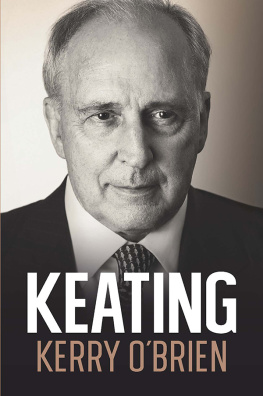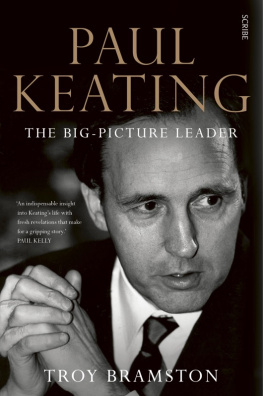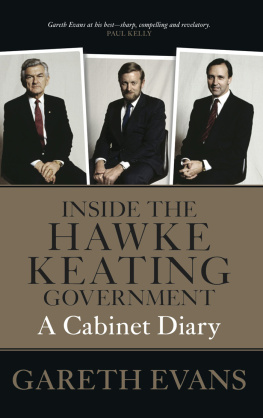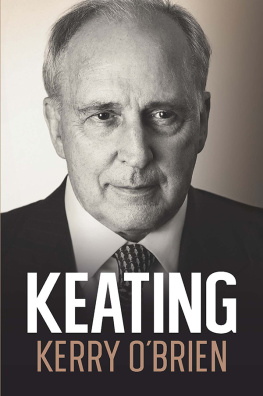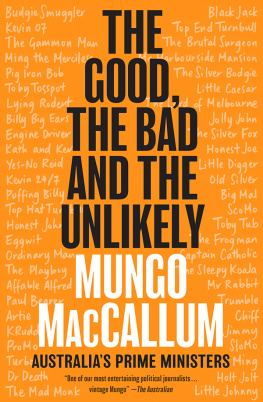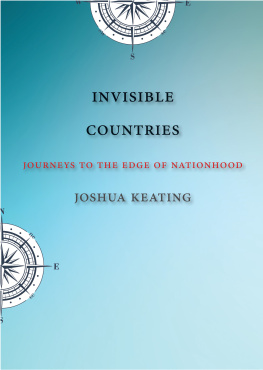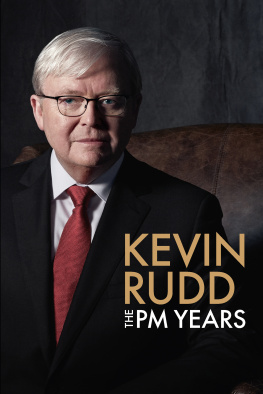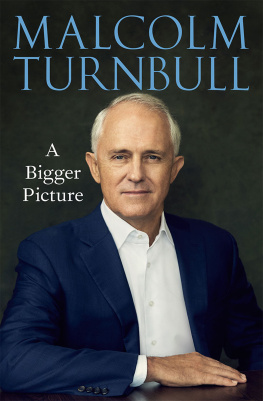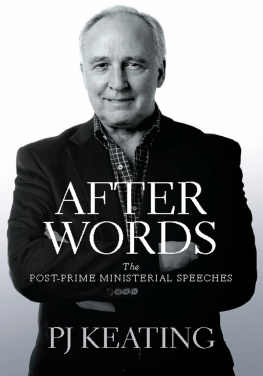First published in 2015
Copyright Kerry OBrien 2015
Front cover photograph: Greg Barrett
Back cover photograph: courtesy of ABC-TV
All other photographs, except where otherwise indicated, courtesy of the Keating Archives.
All rights reserved. No part of this book may be reproduced or transmitted in any form or by any means, electronic or mechanical, including photocopying, recording or by any information storage and retrieval system, without prior permission in writing from the publisher. The Australian Copyright Act 1968 (the Act) allows a maximum of one chapter or 10 per cent of this book, whichever is the greater, to be photocopied by any educational institution for its educational purposes provided that the educational institution (or body that administers it) has given a remuneration notice to the Copyright Agency (Australia) under the Act.
Allen & Unwin
83 Alexander Street
Crows Nest NSW 2065
Australia
Phone: (61 2) 8425 0100
Email:
Web: www.allenandunwin.com
Cataloguing-in-Publication details are available
from the National Library of Australia
www.trove.nla.gov.au
ISBN 978 1 76011 162 5
ISBN 978 1 76029 219 5 (special edition)
eISBN 978 1 92526 848 5 (ebook edition)
CONTENTS
I have known Paul Keating for 40 years. I was first introduced to him in the non-members bar of the old Parliament House when he was a hungry young backbencher in the Whitlam Opposition in 1975, and I suppose I was a hungry young journalist working for an ABC program called This Day Tonight. I met him again the day he became Gough Whitlams youngest and last ministerial appointment, three weeks before the Dismissal. He already had the swagger and an eye for a good suit, and he had future leader written all over him.
I saw Keating at work inside the political system when I was press secretary to Whitlam in his final stint as Opposition leader in 1977, and to deputy leader Lionel Bowen until 1980. Keating was constantly in and out of both offices, his influence and stature growing by the month. I watched him cut his teeth as a brash young parliamentarian. I was also exposed as much to the views of his enemies as his friends, and heard all the criticisms as well as the accolades.
Over the decades of watching politics closely and after countless television interviews with Paul Keating, many of them tense, we have developed what might be described as a relaxed professional relationship rather than a friendship, within which hes never stopped being a political animal and Ive never stopped being a journalist.
Its a lonely business, politics. Friendships between politicians arent impossible and can be deep, but most seem to have a limited life. Very few endure. Journalists, on the other hand, are so endlessly fascinated by power that they wouldnt know whether a relationship with a politician is friendship, or just a reflection of that fascination mixed with varying degrees of respect and mutual self-interest.
When we were negotiating the ABC television series, apart from a request for minimal intrusion on his family life, Keatings only caveat was that the conversations be more discursive than the combative style of the usual 7.30 political interviews, which was what Id intended anyway.
You can still be the tiger, he said, and Ill be the tamer.
When we recorded the conversations for the series, my focus was so centred on the challenge at hand that I dismissed all thought of extending the material into a book. Besides, there were already three biographies, Don Watsons prime ministerial portrait, and various other credible accounts of Keatings time as Treasurer and Prime Minister.
What ultimately drew me to this exercise, apart from the overwhelming response the series created, was that our sixteen hours of conversation left me with as many questions as they gave me answers. Powerful medium though it is, the limitations of television and the tyranny of the ticking clock meant that after the extensive edit, many topics were touched on but not exhausted, and others were not even raised. For instance, media policy has always been one of the great Labor obsessions, and no one was more obsessed than Paul Keating, but I felt if we didnt have the time to tackle that topic properly then we shouldnt waste precious time on it at all.
I was particularly frustrated, and I know Keating was too, by the impossible task of doing justice to the policy and politics of four-and-a-quarter years of the prime ministership in one hour. Looking back twenty years after it all ended, I was surprised how much ground there was to cover, and how much was left unanalysed.
We are never going to get an autobiography from Paul Keating, which is pretty extraordinary given his impact on modern Australia. Hes been consistent in saying that for many years. Yet its clear he cares about his place in history, which was his incentive in cooperating with the television series and now the book. At the same time I could see as we travelled through the years that reliving the times is surprisingly painful for him, a tacit acknowledgement that even the most successful political lives do come at a cost. Probably the more successful, the bigger the cost.
Keatings regret and frustration over the relationship with Bob Hawke is particularly palpable, that such a productive partnership could end so bitterly, and he and Hawke will never agree now on why it failed. On the one hand, Keating wants the strength of the relationship and its legacy to be properly understood. On the other, you get the sense hell never come to terms with his own bitterness over its ultimate collapse.
In the same way, he still seethes at his recollections of the schism between he and his office and the Labor Partys campaign office during the 1996 election campaign. He will never accept that party officials might be smarter on campaign strategy than a leader who had been making sharp political judgements daily for thirteen years, and is particularly angry that they didnt give him even a sliver of a chance of beating John Howard. It says something about the intensity and complexity of the man that he still cant let go all these years later.
I have read a lot of biographies over many years, some of which have been superb. But often you emerge with a sense that the authentic voice of the subject is leached out to varying degrees in the filtering process. David Marrs biography of Patrick White was one wonderful exception, not least because Marr had the great good sense to let Whites own voice come through from his copious letters.
With a political autobiography you might get the authentic voice of the politician but the self-serving side of the enterprise will not be tempered by the challenge of an honest broker that you will hopefully get from a biographer.
I am neither Paul Keatings biographer nor his ghostwriter, and Im not aware theres been an exercise quite like this before. What I think and hope has emerged with this book is an amalgam of the two; that, along with the Keatings authentic voice in a series of freewheeling conversations, are some robust challenges to his account of the political history he lived through and his part in it; and that readers get enough of both to make up their own minds about what this notable political life represents.
In shaping those conversations I have drawn on many thousands of pages of Keating biographies and other excellent accounts of the political times in which he lived, including biographies of other politicians, autobiographies, memoirs, political diaries and other works of political history including Paul Kellys seminal work; on thousands of newspaper articles collected week by week through Keatings career, many unflattering to him; hundreds of pages of interviews recorded with all the key Hawke Cabinet ministers for the ABCs groundbreaking

